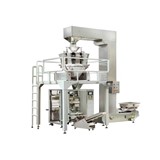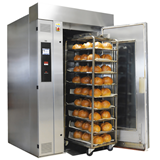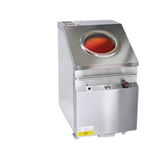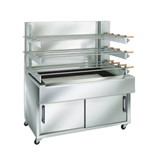In the fast-paced world of commercial kitchens, electric combi ovens have become indispensable assets, streamlining cooking processes and delivering culinary excellence. As the heart of the kitchen, these versatile appliances require diligent maintenance and cleaning to ensure optimal performance and longevity.
This comprehensive guide delves into the crucial aspects of maintaining and cleaning commercial combi ovens, equipping kitchen operators with the knowledge and insights needed to keep their ovens in top-notch condition. From regular cleaning schedules to professional servicing, we leave no stone unturned in our quest to maximize hygiene, efficiency, and food safety standards in your culinary haven.
1. Regular Cleaning and Maintenance Schedule
A well-structured cleaning and maintenance schedule is the foundation of a smoothly operating electric combi oven. By implementing a routine regimen, you ensure that your oven performs at its best and maintains impeccable hygiene standards.
Key points to consider for a regular cleaning and maintenance schedule include:
- Daily Cleaning Tasks: Create a checklist for daily cleaning tasks, such as wiping down surfaces, removing food debris, and cleaning filters.
- Weekly Maintenance: Set aside time for more thorough weekly maintenance tasks, including cleaning interior surfaces and checking door seals.
- Monthly Inspections: Perform monthly inspections to assess the condition of the oven and address any emerging issues promptly.
- Cleaning Logs: Maintain detailed cleaning logs to track the cleaning and maintenance activities, ensuring accountability and adherence to the schedule.
- Staff Training: Train your kitchen staff on the importance of regular cleaning and maintenance, empowering them to contribute to the oven's longevity.
By establishing a regular cleaning and maintenance schedule, you create a proactive approach to oven care, minimizing the risk of breakdowns and ensuring your oven remains a reliable workhorse in your kitchen.
2. Care for Interior and Exterior Surfaces:
The interior and exterior surfaces of your electric combi oven are the first line of defense against food residue, grease, and grime. Proper care of these surfaces ensures hygiene and helps maintain the oven's aesthetic appeal.
Key points for caring for interior and exterior surfaces include:
- Material Considerations: Identify the materials used in constructing the oven's interior and exterior surfaces to determine the appropriate cleaning agents and methods.
- Daily Cleaning Routine: Wipe down the exterior surfaces daily using a damp cloth or mild detergent. Pay special attention to control panels and knobs to prevent the buildup of grime.
- Interior Cleaning: After each use, clean the interior surfaces using a soft brush or sponge and a non-abrasive cleaning solution to remove food residues.
- Avoiding Harsh Chemicals: Refrain from using harsh chemicals or abrasive scouring pads, as they can damage the surfaces and compromise the oven's integrity.
- Polishing and Shine: Periodically polish the exterior surfaces to maintain their shine and appeal. However, avoid contact with control panels and display screens.
Proper care for interior and exterior surfaces enhances the oven's appearance and extends its life while promoting a clean and professional kitchen environment.
3. Descaling and Preventing Limescale Buildup
Limescale buildup can be a persistent nuisance in electric combi ovens, hindering steam generation and compromising cooking efficiency. Descaling is a crucial maintenance task to combat this issue effectively.
Key points for descaling and preventing limescale buildup include:
- Understanding Limescale Formation: Limescale forms when minerals in water accumulate and solidify on surfaces, particularly in areas where water is heated.
- Frequency of Descaling: Establish a descaling schedule based on the water hardness level in your area and the oven's usage frequency.
- Descaling Agents: Use descaling agents recommended by the oven's manufacturer to ensure safe and effective descaling.
- Manual vs. Automated Descaling: Depending on the oven model, descaling can be performed manually or automatically through the oven's descaling program.
- Preventive Measures: Implement water treatment measures, such as water softeners or filters, to reduce limescale buildup and prolong the oven's life.
By effectively descaling and implementing preventive measures, you maintain the steam generation system's efficiency, leading to consistent cooking results and reduced energy consumption.
4. Cleaning the Steam Generation System
The steam generation system is a critical component of commercial electric combi ovens, playing a pivotal role in creating the moist cooking environment necessary for various culinary techniques. Keeping this system clean and well-maintained is of utmost importance to ensure optimal oven performance and precise cooking results. Here are some key reasons why cleaning the steam generation system is crucial:
- Efficient Steam Production: The steam generation system is responsible for producing the steam that is used in cooking. If the system is clogged or not functioning efficiently, it can lead to inadequate steam production. This, in turn, may result in uneven cooking, longer cooking times, and compromised food quality.
- Consistent Cooking Results: In a commercial kitchen, consistency is key. Cleaning the steam generation system ensures that the steam is produced at the right pressure and temperature, leading to consistent and uniform cooking results. This is particularly important for delicate dishes that require precise cooking to achieve the desired texture and flavor.
- Preventing Clogs and Buildup: Over time, minerals and impurities from water can accumulate in the steam generation system, leading to clogs and buildup. Regular cleaning helps prevent these issues and ensures smooth steam flow, avoiding potential disruptions in cooking operations.
- Extending the Lifespan of Components: The steam generation system consists of various components such as filters, nozzles, and chambers. Cleaning these components regularly helps prevent premature wear and tear, extending their lifespan and reducing the need for frequent replacements.
- Energy Efficiency: A clean steam generation system operates more efficiently, using less energy to produce the required steam. This translates to cost savings in the long run, as the oven consumes less power to function optimally.
- Hygiene and Food Safety: A well-maintained steam generation system contributes to the overall hygiene and food safety in the kitchen. Any buildup of debris or impurities can contaminate the steam and, subsequently, the food being cooked, compromising the safety and quality of the dishes.
- Enhanced Flavor and Texture: Steam is a gentle cooking method that helps retain the natural flavors, colors, and textures of food. A clean steam generation system ensures that the steam remains pure and uncontaminated, preserving the integrity of the ingredients and enhancing the overall dining experience for customers.
Cleaning the steam generation system of commercial combi ovens is a fundamental aspect of proper maintenance. It ensures efficient steam production, consistent cooking results, and extends the lifespan of components. Moreover, a clean system contributes to energy efficiency, food safety, and elevated culinary outcomes. By prioritizing the cleaning of this vital component, chefs and kitchen operators can unleash the full potential of their electric combi ovens and deliver exceptional dishes to their delighted patrons.
Key points for cleaning the steam generation system include:
- Regular Cleaning Routine: Include the steam generation system in your daily and weekly cleaning routine to prevent clogs and buildup.
- Drainage and Water Quality: Check the steam generation system's drainage and ensure that the water used is of high quality and free from impurities.
- Removing Water Residues: Periodically inspect the steam generation chamber and remove any water residues or mineral deposits that may accumulate.
- Cleaning Agents: Use manufacturer-recommended cleaning agents for the steam generation system to avoid damage and maintain performance.
- Cleaning Filters and Nozzles: Clean filters and nozzles regularly to ensure uninterrupted steam flow and even cooking.
Cleaning the steam generation system guarantees efficient steam production, leading to moist and succulent dishes that will impress your customers.
5. Checking and Replacing Seals and Gaskets
Seals and gaskets play a critical role in maintaining a tight seal within the electric combi oven, preventing heat and steam from escaping. Regularly checking and replacing worn seals ensures optimal cooking conditions and energy efficiency.
Key points for checking and replacing seals and gaskets include:
- Visual Inspections: Conduct visual inspections of door seals and gaskets to identify signs of wear, damage, or misalignment.
- Tightness Test: Perform a tightness test by closing the oven door with a piece of paper between the seal. If the paper can be easily pulled out, the seal may need replacement.
- Seal Cleaning: Keep seals and gaskets clean from food residues and debris to maintain their effectiveness.
- Replacement Timing: Follow the manufacturer's recommendations for seal replacement intervals to avoid potential issues.
- Proper Installation: Ensure that replacement seals and gaskets are installed correctly to achieve a proper seal.
Checking and replacing seals and gaskets promptly guarantees efficient heat retention and even cooking, minimizing energy wastage and enhancing the oven's performance.
6. Professional Servicing and Calibration
While daily and weekly maintenance tasks can be handled in-house, professional servicing and calibration are vital for thorough inspections and precision adjustments that ensure peak oven performance.
Key points for professional servicing and calibration include:
- Scheduled Servicing: Establish a schedule for professional servicing and calibration based on the oven's usage and the manufacturer's recommendations.
- Qualified Technicians: Engage qualified and experienced technicians who specialize in commercial electric combi ovens for the servicing and calibration tasks.
- Inspection and Testing: A professional technician will thoroughly inspect all components, test performance, and make necessary adjustments.
- Calibration Accuracy: Calibration ensures that the oven's temperature, humidity, and other settings are accurate and in line with industry standards.
- Record Keeping: Maintain detailed records of professional servicing and calibration for future reference and warranty compliance.
Professional servicing and calibration optimize oven performance, reduce the risk of breakdowns, and ensure precise cooking, meeting the highest culinary standards.
7. Ensuring Hygiene and Food Safety Standards
Ensuring hygiene and food safety standards in a commercial electric combi oven is of paramount importance for several compelling reasons.
As the heart of the kitchen, the oven plays a crucial role in food preparation, and any compromise in cleanliness can lead to severe consequences. Here's why maintaining high levels of hygiene and food safety is non-negotiable:
- Customer Safety: The safety and well-being of customers are the top priority for any food establishment. Contaminated food prepared in an unclean oven can lead to foodborne illnesses, causing harm to customers and damaging the establishment's reputation. Ensuring hygiene and food safety in the oven helps prevent the spread of harmful bacteria, viruses, and pathogens, minimizing the risk of foodborne diseases.
- Compliance with Regulations: Health authorities set strict regulations and standards for food safety in commercial kitchens. Failure to comply with these regulations can result in hefty fines, legal consequences, and even closure of the establishment. By maintaining hygiene and food safety standards, businesses demonstrate their commitment to following the law and providing safe, quality food to their customers.
- Reputation and Trust: A positive reputation is essential for any food business. Customers expect clean and safe food preparation environments, and a single incident of food poisoning or contamination can tarnish a restaurant's reputation for years. On the other hand, a strong commitment to hygiene and food safety builds trust with customers, leading to repeat business and positive word-of-mouth referrals.
- Employee Health and Morale: A hygienic work environment promotes employee well-being and morale. Clean and safe working conditions contribute to a positive and motivated workforce, resulting in increased productivity and efficiency. Employees are more likely to take pride in their work and adhere to food safety protocols when they see their employer prioritizing hygiene.
- Preventing Cross-Contamination: Cross-contamination is a significant risk in commercial kitchens, and proper cleaning and maintenance of the oven play a crucial role in preventing it. Ensuring separate cleaning tools for different areas of the oven, such as interior and exterior surfaces, prevents the transfer of contaminants from one surface to another.
- Longevity of Equipment: Hygiene and proper maintenance not only ensure food safety but also extend the lifespan of the electric combi oven. Regular cleaning and servicing prevent the buildup of grease, grime, and limescale, reducing the risk of mechanical failures and breakdowns. This results in cost savings in the long run, as the oven remains operational for an extended period.
Maintaining hygiene and food safety standards in a commercial electric combi oven is not only a legal obligation but also a vital aspect of ensuring customer safety, building a positive reputation, and promoting employee well-being. With meticulous attention to cleaning, sanitization, and compliance with regulations, businesses can create a safe and hygienic environment where delectable dishes are prepared with precision and care.
Key points for ensuring hygiene and food safety standards include:
- Compliance with Regulations: Familiarize yourself with local health and safety regulations pertaining to commercial kitchen equipment maintenance and hygiene.
- Sanitization Practices: Incorporate sanitization practices into your cleaning routine to eliminate harmful bacteria and pathogens.
- Safe Handling of Cleaning Agents: Train kitchen staff in the proper handling and storage of cleaning agents to prevent contamination.
- Temperature Monitoring: Regularly check and record the oven's temperature to ensure it consistently reaches safe cooking levels.
- Avoiding Cross-Contamination: Implement measures to prevent cross-contamination, such as using separate cleaning tools for different areas of the oven.
By prioritizing hygiene and food safety, you uphold your establishment's reputation and create a safe environment for both staff and customers.
Conclusion
Understanding the importance of a regular cleaning and maintenance schedule sets the groundwork for efficient oven care. Paying attention to the care of interior and exterior surfaces maintains hygiene and aesthetic appeal. Descale and prevent limescale buildup to preserve the steam generation system's efficiency. Regularly clean the steam generation system to achieve consistent and precise cooking results. Checking and replacing seals and gaskets guarantees proper heat retention and energy efficiency. Professional servicing and calibration optimize performance and prolong the oven's lifespan. Prioritizing hygiene and food safety ensures compliance with regulations and upholds your establishment's reputation.
By incorporating these practices into your culinary haven, you will maximize the potential of your commercial electric combi oven, creating delectable dishes that delight your customers and elevate your kitchen operations to new heights.




-160x160-state_article-rel-cat.png)









-160x160-state_article-rel-cat.png)











